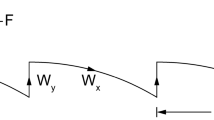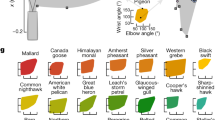Abstract
IF we imagine the linear dimensions of a bird increased n times, its weight will be increased n8 times. On the other hand, the work necessary to keep it flying will, as Helmholtz has shown, increase n7 times.1 Now, we can assume that the power, that is to say, the amount of work that can be done in the unit of time, increases in proportion to the weight, or even less. Helmholtz, therefore, concluded that large dimensions are a disadvantage, and that there is a limit beyond which the power will become inadequate to the increased weight. This limit, in his opinion, is already attained in the largest birds, whose bodies appear to be constructed with the utmost economy in weight, and whose constitution and food seem adapted to furnish the highest power. And he therefore thought it improbable that man would ever be able to fly by his own power.
This is a preview of subscription content, access via your institution
Access options
Subscribe to this journal
Receive 51 print issues and online access
$199.00 per year
only $3.90 per issue
Buy this article
- Purchase on Springer Link
- Instant access to full article PDF
Prices may be subject to local taxes which are calculated during checkout
Similar content being viewed by others
References
Helmholtz, Gesammelte Abhandlungen, bd. 1, p. 165.
O. Lilienthal, "Der Vogelflug," p. 115; see also No. 55 of Prometheus, p. 37.
See his article in Nos. 204 and 205 of Prometheus from which the illustrations are taken.
Rights and permissions
About this article
Cite this article
RUNGE, C. Experiments on Flying. Nature 49, 157–158 (1893). https://doi.org/10.1038/049157a0
Issue Date:
DOI: https://doi.org/10.1038/049157a0
Comments
By submitting a comment you agree to abide by our Terms and Community Guidelines. If you find something abusive or that does not comply with our terms or guidelines please flag it as inappropriate.



